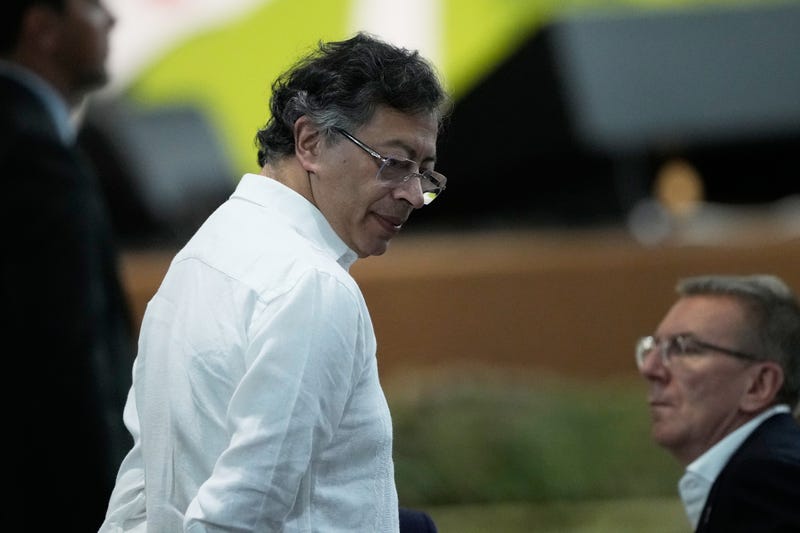
BOGOTA, Colombia (AP) — Representatives of European, Latin American and Caribbean nations on Sunday began a two-day summit in Colombia to try to strengthen ties despite questions on the gathering's relevance and divisions in the Western Hemisphere over the U.S. military operation targeting alleged drug-carrying vessels.
Colombian officials have indicated they will seek the signing of a declaration on renewable energy, food security, financing and technological cooperation at the end of the summit of the Community of Latin American and Caribbean States and the European Union. The deadly U.S. operation, however, will likely become a key point of discussion as Colombian President Gustavo Petro is among its strongest critics.
The U.S. strikes against alleged drug-carrying vessels in the Caribbean Sea and Eastern Pacific have killed more than 60 people since September. Petro has called the deaths “extrajudicial executions” and has identified at least one of the killed as a Colombian citizen. One of two known survivors of the attacks is also Colombian.
“What are we doing with this meeting in today’s world amidst missiles?” Petro asked attendees in his inaugural remarks after mentioning the war in Gaza and the strikes obliterating the vessels. He then added that his wish was for the summit “to be a beacon of light amidst the barbarity.”
But the relevance of the summit in the northern Colombia city of Santa Marta has come into question because of the absence of heads of state and senior officials, including European Commission President Ursula von der Leyen, and German Chancellor Friedrich Merz.
Colombia’s Foreign Ministry has attributed the issue to scheduling conflicts with a United Nations climate summit and has sought to downplay concerns by highlighting the presence of Spanish Prime Minister Pedro Sánchez and Brazilian President Luiz Inácio Lula da Silva.
Following Petro's remarks, some leaders highlighted the increase in trade between the regions and joint progress in digital connectivity programs, the green transition, social development and artificial intelligence.
“We choose dialogue, not division; we choose cooperation, not confrontation; we choose partnership, not isolation. And in this multipolar world of ours, what is needed is a multilateral response,” European Council President António Costa said without mentioning the attacks on the vessels.
Lula surprised observers Wednesday by announcing that he would attend the summit even though Brazil was hosting the COP30 climate conference. Brazilian Foreign Minister Mauro Vieira told reporters that Lula’s decision to attend the summit in Colombia reflects regional solidarity with Venezuela.
Brazilian Ambassador Gisela Padovan, secretary for Latin America and the Caribbean, said Thursday that addressing U.S. President Donald Trump’s threats of military action against Venezuela and recent boat strikes in the Caribbean would be a natural topic at the summit.
“It’s clear that the topic will come up, because the Venezuelan delegation will bring it up,” Padovan said. However, she didn't tell reporters whether the gathering’s final statement would include the issue.
Lula has urged Latin American nations to help prevent conflict in Venezuela. On Tuesday, he told reporters that he had also urged Trump during their meeting last month in Malaysia to follow the example of former U.S. President George W. Bush, who participated in efforts to pacify Venezuela following a 2002 coup attempt against then President Hugo Chávez.
“I told Trump that Latin America is a region of peace,” Lula said.
Alexander Main, international policy director at the Center for Economic and Policy Research think tank, said the gathering in Colombia is the last high-level multilateral summit to be held in the region in 2025 following the postponement of the Summit of the Americas. This could make it easier for governments to frankly address the central issue of military deployment, given that the United States isn’t a party to the summit.
“It is clearly a priority for several regional leaders,” Main said.
___
Associated Press writers Regina Garcia Cano in Caracas, Venezuela, Gabriela Molina in Quito, Ecuador, and Gabriela Sá Pessoa in Sao Paulo, contributed to this report.